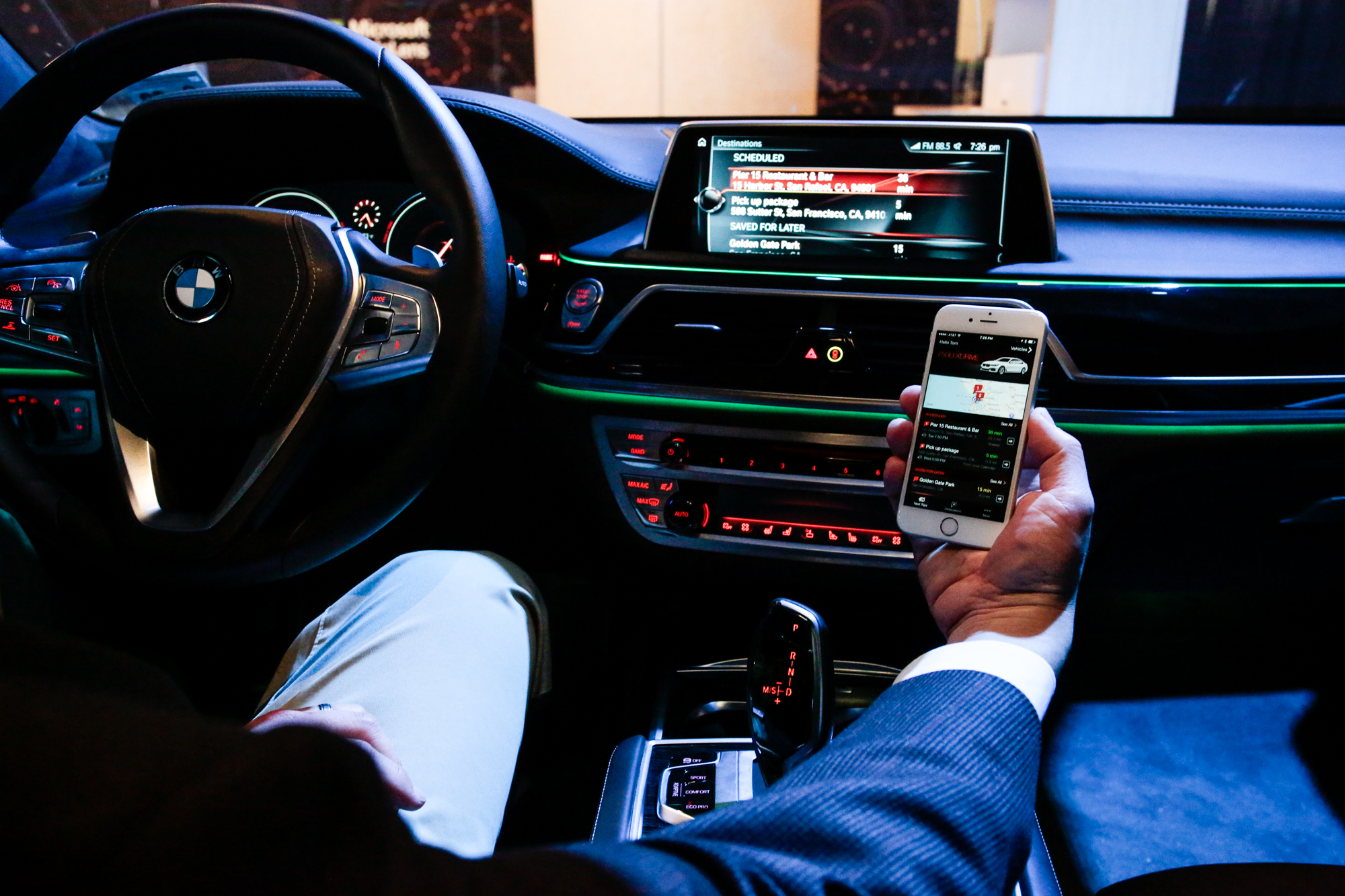![635950257820233396-bmw.jpeg [image : 82470170]](http://www.gannett-cdn.com/media/2016/03/31/USATODAY/USATODAY/635950257820233396-bmw.jpeg)
SAN FRANCISCO — The connected car just got a little bit smarter.
Drivers of late model BMWs can now get smartphone and Apple Watch alerts to leave early due to traffic or walking directions to a destination after they've parked their cars thanks to a new app powered by Microsoft's Azure cloud.
BMW and Microsoft announced the new BMW Connected service Thursday at Build, Microsoft's annual developers conference. The iOS app is available today, and will work with a 2014-or-newer BMW. In time, the app should be able to sync with BMW's back to 2011. An Android version of the app is due later this year.
"This is all about safety and convenience through an app that learns all about who you are and what you do," says Randy Cavaiani, director of partner and product marketing for BMW. "The cloud is critical to something like this, where in order to scale the service you need tremendous computing capacity to deal with adding users and their data as well as growing partner services."
Once derided for not even being able to add a decent stereo system to a car, automakers have gotten the technology memo big time in recent years spurred in part by Silicon Valley companies.
![Microsoft CEO Nadella: 'Bots are the new apps' [oembed : 82470196] [oembed : 82470196] [oembed : 82470196] [oembed : 82470196] [oembed : 82470196] [oembed : 82470196] [oembed : 82470196] [oembed : 82470196] [oembed : 82470196] [oembed : 82470196]](/Portals/_default/Skins/PrestoLegacy/CommonCss/images/smartembed.png)
For example, Google's leadership on the autonomous car front has inspired auto giants from Ford to the Volkswagen Group to add a growing list of driver-assist features to traditional passenger vehicles. And Apple's desire to own the car's infotainment system (and possibly more, if Apple's car project rumors are to be believed) has spurred automakers to offer in-car tech that allows them to brand such features themselves as opposed to ceding them to Apple's Car Play or Google's Android Auto.
BMW Connected is an example of just that, with the storied Bavarian company looking to provide customers with a suite of services that ideally will cement a driver's relationship with the product.
In a demo at Build, Cavaiani showed how upon entering the luxurious BMW 750iL, the in-dash screen first greets the driver by name. Because a destination has been pulled in from a calendar invitation ahead of time, the car instantly fires up the navigation system without any actions from the driver. Another feature is the ability to draw from a series of pre-written text messages that a driver can send with the touch of a button that tells address book contacts your arrival time. The app also will alert you if traffic conditions require an earlier departure time.
![Cloud warriors led by Amazon, Microsoft battle for $300B in spoils [oembed : 82470292] [oembed : 82470292] [oembed : 82470292] [oembed : 82470292] [oembed : 82470292] [oembed : 82470292] [oembed : 82470292] [oembed : 82470292] [oembed : 82470292] [oembed : 82470292]](/Portals/_default/Skins/PrestoLegacy/CommonCss/images/smartembed.png)
Cross-app functionality was demonstrated by opening the Yelp app on a smartphone enabled with the BMW Connected app, choosing a restaurant, touching "Directions" and suddenly that request is handed over to the BMW app which then connects with the car's computer.
So-called "last mile" features include in-app suggestions for walking or public transit options to a final destination once the car has been parked. In time, BMW hopes to add third-party options that can make car sharing reservations and suggest parking options while en route.
"That last mile option is very big in Europe where people use many modes of transportation, and in time we think it will prove useful here as well," says Cavaiani.
For Microsoft, playing in the automotive space is nothing new. Its Azure cloud has been used for some time to power connected car features in Fords and Toyotas, and in January at the Consumer Electronics Show, Volvo, Nissan and audio aftermarket giant Harman announced they would be expanding their partnerships with Microsoft.
![We test HoloLens, VR's augmented cousin [oembed : 82470212] [oembed : 82470212] [oembed : 82470212] [oembed : 82470212] [oembed : 82470212] [oembed : 82470212] [oembed : 82470212] [oembed : 82470212] [oembed : 82470212] [oembed : 82470212]](/Portals/_default/Skins/PrestoLegacy/CommonCss/images/smartembed.png)
"The idea is simply to use the power of our cloud service to create a branded experience for the customer," says Sanjay Ravi, who focuses on automotive, aerospace and industrial alliances at Microsoft. "Every consumer today wants a personalized experience. To do that, you need to weave in the intelligent cloud and its ability to provide real-time machine learning and data analytics on a huge scale."
Microsoft CEO Satya Nadella, now two years in the job, continues to push the company to be a more nimble cloud- and mobile-first enterprise that embraces partnerships in an effort to stay relevant in a new technological era.
Build's day-two keynote Thursday was focused on updating developers about Azure, which continues to be a critical source of revenue as Microsoft shifts away from a software licensing model and grapples with declining global PC sales. Azure has 10% of global cloud market share, second only to Amazon's pioneering AWS with 30%.
Follow USA TODAY tech reporter Marco della Cava on Twitter @marcodellacava


